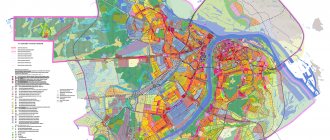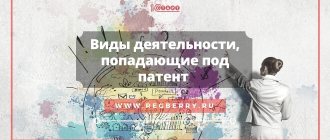Transactions not subject to VAT: complete list
Transactions and goods not subject to VAT for sale (or use for one’s own needs) are collected in a list that is exhaustive and cannot be expanded.
The list is shown in paragraphs. 1–3 tbsp. 149 of the Tax Code of the Russian Federation: I. Activities for the transfer of premises for rent to non-residents (individuals and legal entities) who have received accreditation in Russia (clause 1 of Article 149 of the Tax Code of the Russian Federation). The list of foreign states for whose citizens and/or organizations VAT exemption may be applied is listed in the general order of the Ministry of Foreign Affairs and the Ministry of Finance of Russia dated May 8, 2007 No. 6498/40n.
At the same time, this type of activity also includes operational (utility) maintenance of leased premises on the terms specified above, if this type of service is specified in the lease agreement (Resolution of the Federal Antimonopoly Service of the Moscow District dated April 22, 2010 No. KA-A40/2596-10) .
II. Sale of goods, provision of services, including for one’s own needs, specified in clause 2 of Art. 149 of the Tax Code of the Russian Federation, is also not subject to VAT. The list is quite lengthy - it consists of more than 30 items, but it is worth mentioning them all. Most of the positions listed in this paragraph have a clear socially oriented orientation:
- Medical products (domestic and foreign) in accordance with the list approved by Decree of the Government of the Russian Federation dated September 30, 2015 No. 1042 (taking into account changes made by Decrees of the Government of the Russian Federation dated December 31, 2016 No. 1581, dated November 22, 2017 No. 1404).
These include:
- medical products;
What you need to submit to the Federal Tax Service to obtain VAT exemption for medical products, see the link.
- prostheses and components for them;
- technical equipment (including vehicles) for disabled people;
- glasses and lenses intended for vision correction, frames for such glasses.
- Medical services provided by organizations and individual entrepreneurs engaged in medical activities (except for veterinary and sanitary epidemiological services):
- provided within the framework of insurance policies for compulsory medical insurance;
- prevention, diagnosis and treatment of the population - the list of permitted activities was approved by Government Decree No. 132 dated February 20, 2001;
- collection of blood from the population;
- emergency medical care to the population;
- nursing services;
- pathologist services;
- medical care for pregnant women, newborns, drug addicts and disabled people.
- Services provided to help the disabled, sick or elderly in accordance with instructions issued by medical institutions or social security authorities.
- Supervision and care services provided to minors as part of the implementation of preschool educational programs, as well as conducting classes in children's sections and clubs.
- Food products produced directly in the canteens of medical and educational institutions, or delivered there ready-made. An explanation for this position is contained in the letter of the Federal Tax Service dated October 19, 2011 No. ED-4-3 / [email protected] At the same time, there is a controversial situation in relation to individual entrepreneurs. Thus, the Ministry of Finance believes that individual entrepreneurs cannot take advantage of the fact that this is an activity not subject to VAT (department letter No. 03-07-14/95 dated September 14, 2009). But there is also positive judicial practice for entrepreneurs. In particular, the ruling of the Supreme Arbitration Court of the Russian Federation dated 02/07/2007 No. 649/07.
- Services of archivists (explanations are contained in the letter of the Federal Tax Service of Moscow dated July 3, 2009 No. 16-15/068560).
- Transportation of the population by passenger transport: urban, with the exception of fixed-route and regular taxis, according to uniform, agreed upon (except for contractual (letter of the Ministry of Finance dated 02/05/2013 No. 03-07-07/2476)) tariffs with local authorities (additional explanations are contained in the letter of the Ministry of Finance dated 11/17/2009 No. 03-07-07/75).
- Ritual services (production of monuments, decoration of tombstones, sale of ritual utensils) in accordance with the list approved by Government Decree No. 567 dated July 31, 2001. Moreover, exactly how the word “ritual” should be understood is explained in the letter of the Ministry of Finance dated November 14, 2011 No. 03- 07-07/69.
- Postage stamps, postcards and envelopes (marked), lottery tickets.
- Providing housing of all forms of ownership for use, and, despite the fact that the Ministry of Finance of Russia excludes hostels from this list (letter dated August 22, 2012 No. 03-07-07/88), judicial practice in resolving a possible conflict with the Federal Tax Service is mostly positive (decrees FAS North Caucasus District dated October 3, 2011 in case No. A32-34416/2010, FAS Moscow District dated December 29, 2011 in case No. A40-120210/10-116-467, FAS Volga District dated March 25, 2010 No. A12-3432/ 2009).
- Coins made of precious metals in circulation in Russia or other countries (the status of the coins can be confirmed by clarifications from the Bank of Russia (letters from the Ministry of Finance dated March 17, 2017 No. 03-07-05/15462, dated August 15, 2016 No. 03-07-07/47731)) .
- Shares in management companies of companies, shares in cooperatives and investment funds, securities and financial instruments of futures transactions, as well as:
- depository services (IMF, IBRD, IDA), with the Central Bank of Russia acting as a depository in rubles;
- services provided by specialized organizations on the basis of a license and related to securities.
- Expired from 01/01/2019.
- Educational services of non-profit organizations. As for the provision of additional educational services specified in the license, a detailed explanation of the application of tax exemption is contained in the letter of the Ministry of Finance dated June 24, 2014 No. 03-07-R3-30162. Consulting services are not included in the list.
When educational services are subject to VAT and when not, find out from this publication.
14.1. Social services and related services.
- Preservation of cultural and historical monuments, structures, buildings, including conservation, restoration, repairs, etc. (detailed explanations are contained in the letter of the Federal Tax Service dated September 7, 2012 No. AS-20-3/970).
- Work within the framework of the construction of housing, social and cultural facilities, related infrastructure and professional retraining centers for military personnel.
16.1. Services within the framework of arbitration, paid for through a non-profit organization, a division of which is this permanent arbitration institution.
- Services related to the collection of state duties and other types of duties and fees, including:
- services for certification of operators (insurers) for vehicle inspection;
- technical inspection services (details on the application of the exemption are in the letter of the Federal Tax Service dated October 19, 2012 No. ED-4-3 / [email protected] ).
- Duty free goods.
- Goods and services (except excisable) as part of the provision of gratuitous assistance (assistance) to the Russian Federation.
- Services in the field of art and culture (cinemas, planetariums, excursion bureaus, etc., with the exception of aquariums, for which there is an explanation in the letter of the Ministry of Finance dated December 12, 2011 No. 03-07-07/83). In relation to operations for the sale of entrance tickets, there is an explanation in the letter of the Ministry of Finance dated 08/07/2012 No. 03-07-11/259, but additional services are not exempt from VAT (letter of the Ministry of Finance dated 02/04/2013 No. 03-07-07/2235) .
- Production of film products by cinematography organizations, transfer of rights to use these products (additional information is contained in letters from the Ministry of Finance dated December 5, 2012 No. 03-07-11/527 and the Federal Tax Service dated February 13, 2013 No. ED-4-3 / [email protected] ). At the same time, the sale of copies of film products is subject to taxation (letter of the Federal Tax Service of Moscow dated October 18, 2010 No. 16-15/108644). In addition, individual entrepreneurs are not exempt from VAT on this item of goods and services (letter of the Ministry of Finance dated July 29, 2011 No. 03-07-14/79). Also exempt from VAT are the rights to use protected results of intellectual activity used and (or) arising in the creation of film products that have received a national film certificate.
- Services at airports and Russian airspace for aircraft maintenance (details in letter of the Ministry of Finance dated 08/07/2012 No. 03-07-08/242).
- Service in ports of water transport (sea vessels, mixed and inland navigation vessels) during parking (details are in the letter of the Ministry of Finance dated May 18, 2012 No. 03-07-07/52). Only persons who ensure the operation of vessels can provide services - otherwise such services are subject to tax (letter of the Ministry of Finance dated 07/08/2011 No. 03-07-08/210).
- Pharmaceutical services from pharmacies for the production of medicines, repair and production of glasses, hearing aids and orthopedic prostheses.
- From 01/01/2018 this paragraph of Art. 149 of the Tax Code of the Russian Federation has lost force (law dated November 27, 2017 No. 335-FZ). From this date, the sale of scrap and waste of ferrous and non-ferrous metals is subject to VAT. But it will be paid by buyers (except for individuals who are not individual entrepreneurs) - clause 8 of Art. 161 of the Tax Code of the Russian Federation imposes on them the duties of a tax agent for VAT.
- Exclusive (copyright) rights, as well as franchises.
- Expired from 01/01/2017.
- Gambling (services for its implementation).
- Trust management of pension savings of insured citizens.
- Transactions related directly to the assignment of the right to claim obligations under the use of financial instruments for futures transactions, which are also exempt from taxation.
- Lost force as of 01/01/2019. Waste paper is now subject to VAT, but buyers are required to charge and pay the tax.
- Services for the sale by foreign persons of the rights to host the FIA Formula 1 World Championship, advertising services sold by the organization that acquired these rights on the territory of the facility “Track for the Formula 1 series road racing” in Sochi.
- Services for the transfer of medical devices (specified in paragraph 4, subparagraph 1, paragraph 2, Article 149 of the Tax Code of the Russian Federation), having the appropriate registration certificate, under financial lease (leasing) agreements with the right to buy.
- Material assets issued from the state material reserve to responsible custodians and borrowers in connection with their refreshment, replacement and in the order of borrowing in accordance with the Law “On State Material Reserve” dated December 29, 1994 No. 79-FZ.
- Services for the technical management of sea-going vessels and mixed (river-sea) navigation vessels provided to foreign persons who are not registered with the tax authorities as taxpayers and operating sea-going vessels and mixed (river-sea) navigation vessels registered in the ship registers of foreign countries . The list of specified services for the technical management of sea vessels is determined by the Government of the Russian Federation.
- From 01/01/2020 - municipal solid waste management services provided by regional municipal solid waste management operators.
III. Business transactions not subject to VAT, specified in paragraph 3 of Art. 149 Tax Code of the Russian Federation:
- Sale (use for personal needs) of goods of religious significance. The list of such goods is specified in Decree of the Government of the Russian Federation dated March 31, 2001 No. 251.
- Sale (transfer for own needs) of goods (with the exception of excisable goods, mineral raw materials, minerals) produced by public organizations that employ at least 80% of disabled people (detailed information is in the letter of the Federal Tax Service dated March 29, 2011 No. KE-4-3 /4902 @). Moreover, if the organization has set the goal of generating income, then such activities are not subject to tax exemption (Resolution of the Supreme Arbitration Court of the Russian Federation dated September 14, 2010 No. 1814/10). In addition, VAT exemption does not apply if organizations of disabled people use the services of subcontractors (Resolution of the Presidium of the Supreme Arbitration Court of the Russian Federation dated June 14, 2011 No. 16970/10). The same benefit can be applied by organizations whose authorized capital consists entirely of contributions from public organizations of disabled people, provided that the average number of disabled people among their employees is at least 50%, and their share in the wage fund is at least 25%.
- Banking operations carried out by banks (except collection). At the same time, services for the preparation and collection of documents for concluding credit and security agreements do not apply to such operations (letter of the Ministry of Finance dated May 31, 2013 No. 03-07-05/20027). Also exempt from VAT are transactions with bank cards, transactions for the execution of bank guarantees, the issuance of guarantees, etc.
- Processing services. The list of services can also be found in the letter of the Ministry of Finance dated July 18, 2012 No. 03-07-05/21.
- Banking operations that can be carried out without a license from the Central Bank of Russia (details are in the letter of the Ministry of Finance dated March 31, 2010 No. 03-07-05/15).
- Sale of handicrafts that have artistic value, if the samples are registered in accordance with Decree of the Government of the Russian Federation of January 18, 2001 No. 35.
- Operations for the provision of insurance services.
- Conducting lotteries (details on the procedure for applying the exemption are in the letter of the Ministry of Finance dated April 12, 2013 No. 03-07-07/12331).
- Sale of concentrates, ore, scrap, which contain precious metals, to the State Fund of Precious Metals and Stones, from the funds of the constituent entities of the Russian Federation - to international organizations, the Central Bank and other banking institutions (additional information is available in letters of the Ministry of Finance dated May 2, 2012 No. 03-07-05/11 and Federal Tax Service dated 02/08/2013 No. ED [email protected] ).
- Sale of uncut diamonds.
- Sale (use for own and intra-system needs) of goods manufactured by prisoners.
- Free transfer of goods (provision of services) within the framework of charity, with the exception of excisable products (letter of the Ministry of Finance dated October 20, 2011 No. 03-07-07/61). Additional information on the application of the VAT exemption can be found in letters from the Ministry of Finance dated October 26, 2011 No. 03-07-07/66 and the Federal Tax Service of Moscow dated December 2, 2009 No. 16-15/126825.
- Sale of entrance tickets printed on strict reporting forms by sports institutions for their events; provision of use of sports facilities for the above-mentioned events. In this case, the intended purpose of the premises being leased is important (letter of the Ministry of Finance dated November 27, 2013 No. 03-07-07/51187).
- Providing legal services.
- Loan in securities or money (details are in the letter of the Ministry of Finance dated November 2, 2012 No. 03-07-07/113), including clearing services.
- Carrying out research and development work, paid from the budget and special funds (letters of the Ministry of Finance dated January 18, 2017 No. 03-03-06/3/1931, Federal Tax Service of Russia dated November 18, 2016 No. SD-4-3 / [email protected] contain requirements for submission of supporting documents).
- Excluded.
- Services of sanatoriums and dispensaries, recreation and health centers for children placed on the territory of Russia, if vouchers are issued on strict reporting forms (more information - in letters of the Ministry of Finance dated 04/18/2016 No. 03-07-07/22314, dated 02/19/2016 No. 03- 07-07/9546,04.02.2010 No. 03-07-11/18).
- Firefighting work in forest areas.
- Sale of own agricultural products (with a share in turnover of at least 70%).
- Excluded.
- Sale of residential real estate (letters from the Ministry of Finance dated 04/10/2017 No. 03-07-14/21073, dated 03/09/2016 No. 03-07-08/128704, dated 05/16/2011 No. 03-07-05/11 and the Federal Tax Service dated 07/17/2012 No. ED-4-3/ [email protected] ).
- Registration of a share in the common right to the property of an apartment building upon its transfer (sale of an apartment), including the services of developers under equity participation agreements (letter of the Ministry of Finance dated March 14, 2011 No. 03-07-10/04 indicates that persons who are not developers and do not receive VAT exemption). Also exempt from VAT are the services of the developer for the DDU.
- Excluded.
- Marketing transfer of goods, if the cost of purchasing one of them does not exceed 100 rubles. taking into account the clarification of the Plenum of the Supreme Arbitration Court of the Russian Federation on the distribution of advertising materials (Resolution No. 33 dated May 30, 2014). See also: “Advertising goods more expensive than 100 rubles - the court allowed not to pay VAT .
- Assignment of the right to claim obligations by creditors.
- Port work provided by SEZ residents.
- Free provision of print space or airtime in accordance with election legislation.
- Provision of public services (additional information - in letters of the Ministry of Finance dated January 23, 2017 No. 03-07-11/2838, dated January 31, 2017 No. 03-07-11/469, dated September 23, 2015 No. 03-07-15/54498, dated 10/22/2012 No. 03-07-07/110 and Federal Tax Service dated 05/28/2010 No. ШС-37-3/ [email protected] ) managing organizations.
- Provision of services for the maintenance of common household facilities in apartment buildings (letters from the Ministry of Finance dated 03/03/2017 No. SD-19-3/ [email protected] , 11/21/2011 No. 03-07-14/112 and the Federal Tax Service dated 06/17/2016 No. SD-3-3 / [email protected] , dated March 15, 2013 No. AS-3-3/904).
- Lost power.
- Free production or distribution of advertising of a social nature (letter of the Federal Tax Service dated November 18, 2011 No. ED-4-3 / [email protected] ).
- Under an investment partnership agreement - services for managing the affairs of (common) partners.
- Transfer of property rights (contributions) under an investment partnership agreement, including the transfer of rights to a participant in such a partnership when allocating his share.
- Sale (transfer for own needs) of breeding livestock and poultry with a breeding certificate.
- Providing agency services for the sale and lease of state property.
- Repair and maintenance services for goods under warranty.
What VAT-free transactions can be considered benefits?
Due to the fact that taxpayers, when carrying out certain business transactions listed in paragraphs. 1–3 tbsp. 149 of the Tax Code of the Russian Federation, they do not pay VAT, many believe that this is a kind of benefit. But this is not entirely true, because usually only certain categories of entrepreneurs can use benefits, and anyone can carry out VAT-exempt transactions, as long as they have the necessary permits.
However, using the results of the analysis of the Plenum of the Supreme Arbitration Court of the Russian Federation, set out in Resolution No. 33 dated May 30, 2014, we can identify individual operations from Art. 149 of the Tax Code of the Russian Federation, which can be classified as benefits. We are talking about the transfer of goods (services) specified in subparagraph. 5 clause 2, as well as business operations listed in sub-clause. 1, 2, 14 clause 3 of this article of the Tax Code of the Russian Federation.
According to the Ministry of Finance, preferential transactions include the transfer (use for one’s own purposes) of goods or services specified in subparagraph. 5 p. 2 art. 149 of the Tax Code of the Russian Federation (letter of the Ministry of Finance of Russia dated December 3, 2014 No. 03-07-15/61906).
ConsultantPlus experts explained how to reflect the application of the benefit in the VAT return. Get trial access to the K+ system and upgrade to the ready-made solution for free.
Restrictions on donation
The gratuitous transfer of valuables or property rights is essentially a donation (Clause 1, Article 572 of the Civil Code of the Russian Federation).
The transferred objects can be:
- fixed assets;
- goods;
- in cash;
- finished products;
- intangible assets;
- materials;
- securities;
- property claims (rights), for example, this may be the right to use a land plot disinterestedly transferred by a commercial organization to a non-profit institution or a disinterested assignment by a commercial enterprise of the right to demand payment of the debt of its debtor to a non-profit organization.
For commercial enterprises, an acceptable limit for the value of gratuitously transferred valuables has been established - up to 3 thousand rubles. This restriction does not apply to transactions with individuals and public organizations, charitable and other foundations, budgetary institutions, consumer cooperatives, religious and other non-profit organizations. In addition, it is possible to transfer property free of charge to commercial organizations-founders, but provided that such operations are stipulated in the charter. Donation of valuables between commercial organizations in the amount of more than 3 thousand rubles. is considered a violation of the requirements of the law, and such a transaction may be declared invalid (clause 1 of Article 168, subclause 4 of clause 1 of Article 575 of the Civil Code of the Russian Federation).
When donating valuables worth over 3 thousand rubles. a citizen or non-profit organization should draw up a written gift agreement (Articles 574 and 575 of the Civil Code of the Russian Federation).
The transaction of gratuitous transfer of valuables is confirmed by a delivery note or an acceptance certificate.
For information about the form used to draw up the consignment note, read the article “Unified form TORG-12 - form and sample.”
If there is an activity that is not subject to VAT and taxable
In the event that an organization, in addition to activities exempt from taxation, is also engaged in other types for which VAT is calculated, it is necessary to maintain separate accounting. This provision is enshrined in paragraph 4 of Art. 149 of the Tax Code of the Russian Federation.
In this case, it is necessary to take into account the input VAT on goods purchased or services received separately (for taxable and exempt activities). The rules for such tax accounting are given in paragraph 4 of Art. 170 Tax Code of the Russian Federation.
For more details, see the material “How separate accounting for VAT is maintained (principles and methods).”
What is typical is that in Chapter 21 of the Tax Code of the Russian Federation there is no clear indication of exactly how separate accounting should be maintained, so enterprises are given the right to establish the methodology for maintaining it themselves. This methodology is enshrined in the company's accounting policy.
Conditions for applying VAT exemption
In order to take full advantage of the VAT exemption when carrying out operations listed in Art. 149 of the Tax Code of the Russian Federation, you must have permits. According to the fiscal department, first of all we are talking about a license.
Note that most of those listed in Art. 149 of the Tax Code of the Russian Federation, types of operations can be legally carried out only by obtaining a license. Carrying out such activities without a license not only entails the imposition of financial and administrative sanctions, but is also fraught with additional VAT charges.
The list of licensed types of activities is specified in the Law “On Licensing...” dated May 4, 2011 No. 99-FZ. In accordance with Art. 9 of this law, licenses have an unlimited validity period. They need to be re-registered only in 2 cases:
- if it was issued before November 2011 and the period for which it was issued has expired;
- the name of the type of activity for which the license was issued was changed.
If the license has expired and a new one has not yet been issued, then, according to the tax service, the company loses the right to engage in licensed activities. At the same time, there is judicial practice that is positive for taxpayers, when they have done everything necessary, but the license was not issued due to the fault of government agencies (resolutions of the Federal Antimonopoly Service of the Volga District dated July 7, 2011 No. A55-20211/2010 and the Federal Antimonopoly Service of the Far Eastern District dated April 19, 2010 No. F03-2182/2010).
In addition, in many cases, when carrying out activities exempt from VAT, other permitting documents are required. For example, when selling vital medical products, you will need to provide a registration certificate during a tax audit. When selling components or spare parts for medical devices, such certificates will also be required (letter of the Ministry of Finance of Russia dated February 17, 2017 No. 03-07-14/9027).
At what rate to pay VAT if the registration certificate for a medicine has expired, find out by following the link.
Difficult issues and bottlenecks
VAT refund, although it is a taxpayer’s right, is often intimidating due to the complexity of the procedure. Of particular concern to legal entities is the desk audit, which is carried out by the Federal Tax Service to establish the legality of the transaction and verify its real value.
To avoid complications, it is important that the seller does not disappear after the sale. The reliability of the selling party, as well as its relationship with the buyer, is checked first . Other factors are also important, for example, whether the seller pays VAT, whether he is authorized to conduct transactions, etc. These difficulties can only be avoided with a careful approach to the acquisition of property.
Another common problem when refunding VAT is confirming the source of income. You should be prepared for the need to collect and provide evidence that the funds spent on the purchase were obtained legally. During the audit, documents will be requested not only for the organization itself, but also for its counterparties.
Payment of VAT on sales and purchases, as well as its reimbursement, depends on a number of factors. Legal entities can reduce their expenses only if a number of legal conditions are met.
Intermediaries and VAT-exempt transactions
In accordance with paragraph 7 of Art. 149 of the Tax Code of the Russian Federation the right to take advantage of the VAT exemption when carrying out the activities listed in paragraphs. 1–3 of this article of operations do not apply to intermediaries. That is, if a person carries out such activities in someone else’s interests, then he is obliged to pay the full VAT rate on the amount of his remuneration (letter of the Ministry of Finance of Russia dated March 31, 2010 No. 03-07-05/15 and the Federal Tax Service of Moscow dated July 19, 2010 No. 16- 15/075620).
In this case, the exception is transactions for the sale of goods or the provision of services, which are exempt from VAT on the basis of clause 1, sub-clause. 1 and 8 clause 2, sub. 6 clause 3 art. 149 of the Tax Code of the Russian Federation (based on clause 2 of Article 156 of the Tax Code of the Russian Federation).
For more information on this, see the material “Which intermediary services are not subject to VAT” .
LETTERS OF THE FTS AND MINISTRY OF FINANCE.
Back in 2008, the Federal Tax Service in Letter dated November 28, 2008 No. ШС-6-3/ [email protected] (hereinafter referred to as the Letter of the Federal Tax Service of Russia dated November 28, 2008), agreed upon with the Ministry of Finance, noted that starting from January 1, 2006, during the construction of real estate (OS) a special procedure is applied for the restoration of VAT amounts payable to the budget. In particular, the Federal Tax Service formulated the following conclusions:
- from the set of norms of the Tax Code of the Russian Federation follow special rules for the application of tax deductions during the construction of real estate (RP), providing for accelerated deductions of VAT amounts before the commissioning of objects;
- “input” VAT amounts presented during the construction or purchase of capital construction projects are accepted for deduction in full, regardless of the fact that the objects under construction or acquired are intended for use simultaneously in both VAT-taxable and tax-free transactions;
- after the commissioning of such real estate objects, the VAT amounts accepted for deduction are subject to restoration and payment to the budget within 10 years in a special manner.
Naturally, this letter is based on old norms. Formally, it is not applicable to Art. 171.1 of the Tax Code of the Russian Federation, despite the fact that this article, in fact, is part of the paragraphs of paragraph 6 of Art. 171 of the Tax Code of the Russian Federation in the old edition, which were moved to another place, highlighted in a separate article.
In 2015, the Federal Tax Service quite promptly indicated [email protected]
- that Art. 171.1 of the Tax Code of the Russian Federation establishes a special procedure for the restoration of VAT amounts, which applies only to acquired or constructed fixed assets related to real estate;
- that a similar procedure for the restoration of VAT on real estate (with the exception of aircraft, sea vessels, inland navigation vessels, space objects) was applied before 01/01/2015 in accordance with paragraph. 4 – 9 p. 6 tbsp. 171 Tax Code of the Russian Federation.
Note:
Further in the said letter it is written that it is necessary to restore VAT in a special manner within 10 years even when real estate objects begin to be used only in transactions not subject to VAT. Despite the fact that the letter does not say how to deduct VAT, it follows from its logic that the legality of VAT deduction in this case seems to be implied.
Then, in the Letter of the Ministry of Finance of Russia dated December 1, 2016 No. 03‑07‑11/71110, it was explained that VAT should be restored in a special manner specified in Art. 171.1 of the Tax Code of the Russian Federation, it is also necessary if the constructed facility begins to be used in activities subject to UTII. The letter contains an important conclusion: VAT amounts presented upon acquisition under a real estate purchase and sale agreement (RP) are accepted for deduction in full, regardless of the fact that this property is intended to be used simultaneously in transactions subject to VAT or exempt from VAT. , and in activities subject to UTII. After the commissioning of such real estate objects, the tax amounts accepted for deduction are subject to restoration and payment to the budget within 10 years in the manner provided for in paragraphs 4 and 5 of Art. 171.1 Tax Code of the Russian Federation.
Finally, Letter of the Ministry of Finance of Russia dated March 30, 2017 No. 03‑07‑10/18453 also contains a conclusion that is already familiar to us: if real estate properties under construction are intended to be used simultaneously in transactions both subject to VAT and not subject to taxation, the amount of VAT , presented by contractors (developers or technical customers) during capital construction, are accepted for deduction in full in accordance with clause 6 of Art. 171 Tax Code of the Russian Federation. After the commissioning of such real estate objects, the amounts of VAT accepted for deduction are subject to restoration and payment to the budget within 10 years, starting from the year in which the start of depreciation calculation, specified in paragraph 4 of Art. 259 of the Tax Code of the Russian Federation.
As we can see, there is a consistent and uniform position of the Federal Tax Service and the Ministry of Finance on this issue. However, as you know, letters are not normative documents and do not prevent one from following other interpretations of tax legislation (which, in fact, is indicated in all letters except the first).
Let us say right away that the position of the courts does not always coincide with the official opinion expressed in the above letters.
How to refuse VAT exemption
It may be unprofitable for some companies to take advantage of the VAT exemption when carrying out transactions specified in paragraph 3 of Art. 149 of the Tax Code of the Russian Federation (refusal of VAT exemption for business operations from paragraphs 1 and 2 of this article is impossible). Especially for them, the possibility of refusing such an exemption is provided (clause 5 of Article 149 of the Tax Code of the Russian Federation).
For more information, see: “How to refuse VAT exemption” .
You can write a waiver of VAT exemption for one transaction or for several, provided for in different subclauses or within one of them. In this case, the requested period must be at least one year.
You can waive your right to apply tax exemption by sending an application to the territorial Federal Tax Service. The application is drawn up in any form. In this case, it should be done before the 1st day of the month of the tax period in which the company plans to stop using these privileges (taking into account the recommendations set out in the letter of the Federal Tax Service of the Russian Federation dated 08.26.2010 No. ШС-37-3/10064).
For an example of such a statement, see the material “Sample application for refusal of VAT exemption” .
Refusal of the benefit gives the right to apply a deduction of input VAT.
See, for example, “You can apply a VAT deduction when distributing advertising materials worth up to 100 rubles .
COURT DECISIONS IN FAVOR OF TAXPAYERS.
Resolution of the FAS VSO dated 06/07/2013 in case No. A58-2119/2012.
The tax inspectorate concluded that the amounts of VAT previously accepted for deduction during the construction of a residential building were subject to restoration at a time on the basis of clause 3 of Art. 170 of the Tax Code of the Russian Federation in the first quarter of 2010, since the residential building, after commissioning, began to be used only for transactions exempt from taxation. On this basis, the inspection decided that the company unlawfully partially restored VAT in a special manner on the basis of clause 6 of Art. 171 Tax Code of the Russian Federation. The court found the organization's actions legal, and the inspection's opinion erroneous.
The inspectorate insisted on the need for the company to apply the general procedure for VAT recovery established by clause 3 of Art. 170 of the Tax Code of the Russian Federation, which applies to taxpayers using the corresponding fixed asset (including real estate) exclusively for VAT-free purposes.
The court stated the following:
The difference in the procedures for recovering VAT on fixed assets is determined by the fact that if the fixed asset is a piece of real estate acquired or built by the taxpayer in a contract or business manner, then for the subsequent restoration of VAT amounts previously accepted for deduction, the norm established by clause 6 of Art. 171 Tax Code of the Russian Federation.
If the OS is not a piece of real estate, or was acquired by something else not specified in clause 6 of Art. 171 of the Tax Code of the Russian Federation, then in order to restore the amounts of VAT previously accepted for deduction, the norm established by paragraphs. 2 p. 3 art. 170 Tax Code of the Russian Federation.
At the same time, the arbitrators noted: none of clause 3 of Art. 170, neither from paragraph 6 of Art. 171 of the Tax Code of the Russian Federation does not see that the basis for their application is the use of an asset exclusively for operations not subject to VAT, or simultaneously in taxable and non-VAT activities.
The court recognized the interpretation of the provisions of these rules of law applied by the tax inspectorate as a broad interpretation that did not correspond to their meaning.
Note:
By decision of the Supreme Arbitration Court of the Russian Federation dated October 8, 2013 No. VAS-13866/13, the review of this case was refused. Thus, the Supreme Arbitration Court agreed that for real estate objects that begin to be used in non-taxable transactions, a special procedure is provided for the restoration of VAT accepted for deduction upon their acquisition or construction (reconstruction, modernization), that is, in a controversial tax situation, a special norm takes priority, specified in paragraph 6 of Art. 171 Tax Code of the Russian Federation.
Let us note that in this case the application of VAT deductions for a residential building was not disputed.
Resolution of the Seventh Arbitration Court of Appeal dated March 22, 2017 in case No. A27-19536/2016.
The company built a medical center building for itself under contract in order to provide paid medical services, exempt from VAT, as well as for partial rental of non-residential premises. At the same time, according to the initial version of its business plan for the construction of a medical center, the organization did not intend to rent out premises, but then appropriate changes were made to the business plan.
In the fourth quarter of 2015, the company accepted full deduction of VAT on construction and installation work, electricity and water supply, and therefore submitted a tax return reflecting the VAT refundable.
Based on the results of a desk audit, the tax inspectorate refused the organization a VAT refund. At the same time, the inspection did not dispute the correctness of the preparation of primary documents and invoices.
According to the inspection, the company unlawfully applied VAT deductions, since the building is intended to house a medical clinical center and, accordingly, carry out operations for the provision and (or) sale of medical services that are not subject to VAT.
Considering the dispute, the judges declared the inspectorate's decision illegal. At the same time, the explanations set out in the Letter of the Federal Tax Service of Russia dated November 28, 2008 were taken into account, according to which Ch. 21 of the Tax Code of the Russian Federation provides for the possibility of deducting the amount of VAT on construction and installation work during capital construction with the subsequent restoration of the tax in the case of using the object in the operations specified in clause 2 of Art. 170 Tax Code of the Russian Federation.
The arbitrators also indicated that the company has the right to adjust its business plan; the mere presence of a business plan does not limit a person’s ability to carry out one or another type of activity.
Please note that the consideration of this case has not been completed.
For your information:
In addition, without a detailed consideration of the circumstances, we note that in the Decision of the Arbitration Court of the Moscow Region dated October 28, 2016 in case No. A41-15455/16[6], the court of first instance, with reference to the Letter of the Federal Tax Service of Russia dated November 28, 2008, also decided in favor of the taxpayer, which accepted for deduction VAT on energy supply facilities (electricity, heat supply, water supply, sewerage), which were subsequently subject to transfer to the city. The judges indicated: if the objects are transferred to municipal ownership free of charge, then, in accordance with paragraphs. 2 p. 3 art. 170 of the Tax Code of the Russian Federation, the tax previously accepted for deduction will be restored. The decision on the possibility of a taxpayer deducting VAT amounts paid to suppliers of goods (work, services) cannot be determined by the taxpayer’s intentions and plans to use goods or results of work (services) in activities taxable or not subject to VAT; the right to apply tax deductions should be determined by objective rather than subjective criteria. Accordingly, the taxpayer has the right to claim a VAT refund during the period of the relevant business transactions, and in the event of transfer of the object to municipal ownership, restore the specified tax amounts on the basis of paragraphs. 2 p. 3 art. 170 Tax Code of the Russian Federation.
Results
So, an exhaustive list of business transactions that are exempt from VAT is contained in paragraphs. 1–3 tbsp. 149 of the Tax Code of the Russian Federation. All taxpayers who have the necessary permits can use the right to tax exemption in accordance with this article. However, a license is required only when carrying out activities that are subject to licensing.
There are restrictions when performing intermediary activities: in most cases, intermediaries are deprived of the right to take advantage of the VAT exemption (more details are provided in paragraph 7 of Article 149 of the Tax Code of the Russian Federation).
If the taxpayer considers that it is unprofitable for him to use the VAT exemption (for example, when the VAT accepted for deduction exceeds the amount of the tax paid), he can waive his right for a period of more than a year on the basis of clause 5 of Art.
149 of the Tax Code of the Russian Federation. You can find more complete information on the topic in ConsultantPlus. Free trial access to the system for 2 days.
Procedure
The procedure for VAT refund is regulated by Art. 176 Tax Code of the Russian Federation . It involves the following steps:
- Collecting a package of documents that will confirm the need for a refund. It primarily includes an invoice, as well as a purchase and sale agreement, payment certificates and an extract from the sales and purchase books.
- Entering data into the tax return. It contains information about the full cost of the purchased property, and also provides a calculation of the amount of VAT to be refunded.
- Submitting papers to the Federal Tax Service.
The following steps are taken by the tax authority:
- A desk verification of the declared information is carried out. Three months are allotted for its implementation.
- Based on the results of the inspection, a decision is made to return the funds or refuse it.
- The taxpayer is sent a corresponding written notice. If any violations are identified, the taxpayer is given 30 days to eliminate them and challenge the refusal to refund.
- The refunded amount is transferred to the recipient's account.
The money is transferred within five days from the moment the decision on VAT refund is made.







